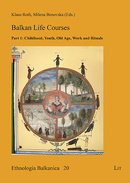Volume 20
Ethnologia Balkanica
Journal for Southeast European Anthropology
Zeitschrift für die Anthropologie Südosteuropas
Journal d’ethnologie du sud-est européen
Volume 20/2017
Balkan Life Courses. Part 1: Childhood, Youth, Old Age, Work and Rituals
Edited by Klaus Roth and Milena Benovska
LIT-Verlag 2018, 314 p., ISSN 1111-0411, ISBN 978-3-643-91026-4
The historical upheavals in Southeast Europe since the early 20th century brought about deep transformations of people’s everyday lives and their life courses. The concept of “life course” enables the understanding of human lives within their socio-cultural and political contexts, stressing agency and people’s everyday experience. Balkan contexts invite for analyses that bridge political and social changes and their influence on individual life courses.
The papers discuss problems such as family life and parenthood, ages and ageing, life-cycle rituals and the artistic expressions devoted to them. The authors present manifestations of the social differentiation and cultural multiplicity under post-socialist or post-colonial conditions – from developing contemporary global life styles among the emerging urban middle class to the ghettoization of some social or age groups. This volume focusses on developing family cultures, on experiencing socialization and age, on “old” and “new” life cycle rituals and their artistic representations in contemporary Southeast Europe.
Klaus Roth is professor em. at the Institute for European Ethnology of the Ludwig-Maximilians-University Munich.
Milena Benovska is professor in cultural anthropology at the New Bulgarian University in Sofia.
Contents:
Editorial
Childhood and Youth
Nevena Dimova, Sofia
Play, Study, Success: Everyday Life of Middle Class Children in Sofia
Zsuzsa Plainer, Cluj-Napoca
“This Is How I Abandoned School and Began Selling Sunflower Seeds”: Work Experiences, Living Conditions, and Relations to Formal Education of Roma Families in a Romanian Town
Velislava Petrova, Sofia
“Are You Giving Water?” New Forms of Expertise in the Field of Infant Diet in Contemporary Bulgaria
Aleksandra Kirova, Sofia
Socialisation, Integration, and Identity in Adolescence: The Use of Social Categories by Pupils from Albania, Kosovo, and Turkey Studying in a French Middle School
Stamatia Gioti, Ioannina
Adaptive Re-uses and Re-significations in Places of Alterity: The Case of a Middle-Range City in Northern Greece
Family, Work and Corporate Culture
Ivanka Petrova, Sofia
Family and Enterprise: Cultural Encounters between the Family Life-World and the Market Economy
Niya Neykova, Sofia
Outsourcing Centres in Bulgaria: How to Build Dreams in the Process of Social Declassing
Old Age and Work
Ilia Iliev, Sofia
Gender and Representations of Successful Old Age in Rural Bulgaria
Georgios Kouzas, Athens
Working Until the End of Their Lives: Older People Working as Itinerant Peddlers in the Centre of Athens
Mila Maeva, Sofia
Bulgarian Elderly Migration to the United Kingdom, or: “Grandparents are Our National Pride”
Life Cycle Rituals
Leontina Gega-Musa, Prishtina
Henna Celebration in Contemporary Kosovo: Bridging the Gap between Globalization and Tradition
Evangelos Avdikos, Volos
From Matchmaker to Marriage Bureau: Traditionalism and Modernity in the Urban Space
Vesna Delić, Belgrade
Until Death Reunite Us: Review of Funeral Rituals in Nikšić, Montenegro
Ioana-Ruxandra Fruntelată, Bucharest
“Carols” for the Dead: Instances of a Dissolving Ritual Sequence in Contemporary Romanian Villages
Representations of Family and Rituals
Mary Margaroni, Berlin/Thessaloniki
Social Representations of the Modern Greek Family in Popular Comic Television Series in Greece over the Last Two Decades
Margarita Kuzova, Graz/Sofia
The Staging of Age: The Image of Children on Bulgarian and Western European Postcards in the Early 20th Century
Maria Velioti-Georgopoulos, Nafplion
Puppet Theatre and Resistance in “Free Greece” (1943–44): The Puppeteer and the Audience of Children
Orjona Shegaj, Tirana
Love, Sexuality and Power in Albanian Traditional Folk Songs
Addresses of Editors and Authors
Instructions to Authors
Links:


